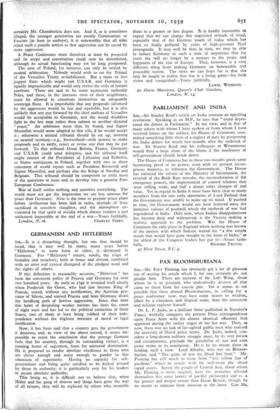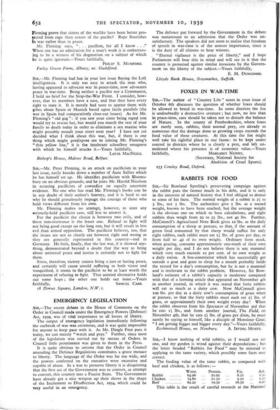PAX BLOOMSBURIANA Sta,—Mr. Peter Fleming has obviously got a lot
of pleasure out of writing his article which I, for one, certainly do not grudge him. There are sections of the Left Wing, about whom he is so petulant, who undoubtedly deserve all that came to them from his caustic pen. Yet it seems to me possible that these abused Bloomsburians, in calling for a peace conference now, may have come nearer to wisdom, albeit by a circuitous and illogical route, than the consistent and militant explorer himself.
Dr. L. P. Jacks, in a brilliant letter published in Tuesday's Times, wistfully compares the present Press correspondence upon Peace Aims with the almost identical effusions that appeared during the earlier stages of the last war. Then, as now, there was no lack of far-sighted public men who realised the necessity of liberal peace terms. Dr. Jacks, indeed, con- siders a long-drawn military struggle must, by its very nature and circumstance, preclude the possibility of just and sane peace terms at its conclusion. He is by no means alone in holding such a view. Lord Allenby, who was no Blooms- burian, said " The gains of war are Dead Sea fruit." Mr. Fleming has still much to learn from " this yellow line of pacifism," which he attacks with the well-worn jibe about raped sisters. Surely the people of Central Asia, about whom Mr. Fleming is more original, have for centuries allowed themselves this same luxury of pacifist philosophy and to a far greater and deeper extent than Great Britain, though by no means as immune from invasion as the latter. Can Mr, Fleming prove that sisters of the warlike have been better pro- tected from rape than sisters of the pacific? Rape flourishes hi war rather than in peace.
Mr. Fleming says, " . . pacifism, for all I know . . ." When one has an admiration for a man's work it is embarrass- ing to be a witness of his dogmatism on a subject of which he is quite ignorant—Yours faithfully, PHILIP S. MUMFORD.
Farley Green Farm, Albury, nr. Guildford.
Sut,—Mr. Fleming had fun in your last issue flaying the Left intelligentsia. It is only too easy to attack the man who, having appeared to advocate war in peace-time, now advocates peace in war-time. Being neither a pacifist nor a Communist, I hold no brief for the Stop-the-War Front. I consider, how- ever, that its members have a case, and that they have every right to state it. It is merely bad taste to spatter them with gibes about Spain or Munich based upon facile parallels (the war in Spain had comparatively clear-cut issues). As for Mr. Fleming's " old gag ": if you saw your sister being raped you would try to rescue her, but would you march the rest of your family to death today in order to eliminate a sex maniac who might possibly assault your sister next year? I have not yet decided what I think about this war, but, if there is one thing which might predispose me to joining Mr. Fleming's thin yellow line," it is the intolerant schoolboy smugness with which he himself attacks it. —Yours faithfully, SIR,—Mr. Peter Fleming, in an attack on pacificism in your last issue, easily knocks down a number of Aunt Sallies which he has himself set up. He identifies pacificism with Blooms- bury on no obvious grounds, and he joins Mr. Harold Nicolson in accusing pacificists of cowardice on equally uncertain evidence. No one who has read Mr. Fleming's books can be in any doubt of their author's bravery, and it is hard to see why he should gratuitously impugn the courage of those who hold views different from his own.
Mr. Fleming makes no attempt, however, to state any seriously-held pacificist case, still less to answer it.
For the pacificist the choice is between two evils, and of these non-resistance is the lesser one. Refusal to fight will not bring good except on the long run, but it will result in less evil than armed opposition. The pacificist believes, too, that the issues are not so clearly cut between right and wrong as they are generally represented in this country—and in Germany. He feels, finally, that the last war, if it showed any- thing, demonstrated beyond a doubt that the way to bring about universal peace and justice is certainly not to fight for them.
Since, therefore, victory cannot bring a just or lasting peace, and certainly will cause untold suffering to both victor and vanquished, it seems to the pacificist to be at least worth the experiment of refusing to fight. That untried alternative holds out some hope ; the other one holds out none.—Yours faithfully, SAMUEL CARR. r8 Dorset Square, London, N.W. 1.





































 Previous page
Previous page